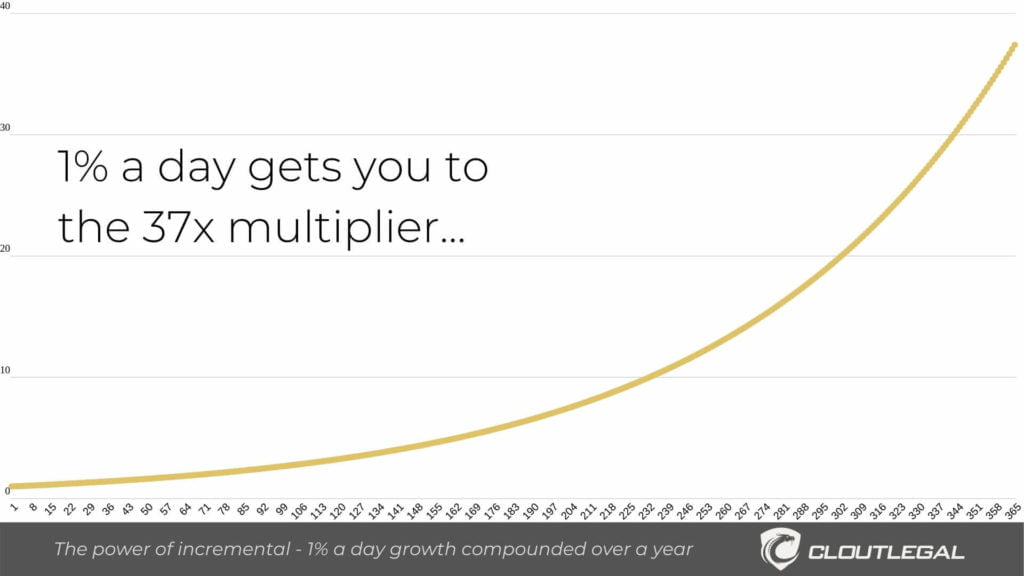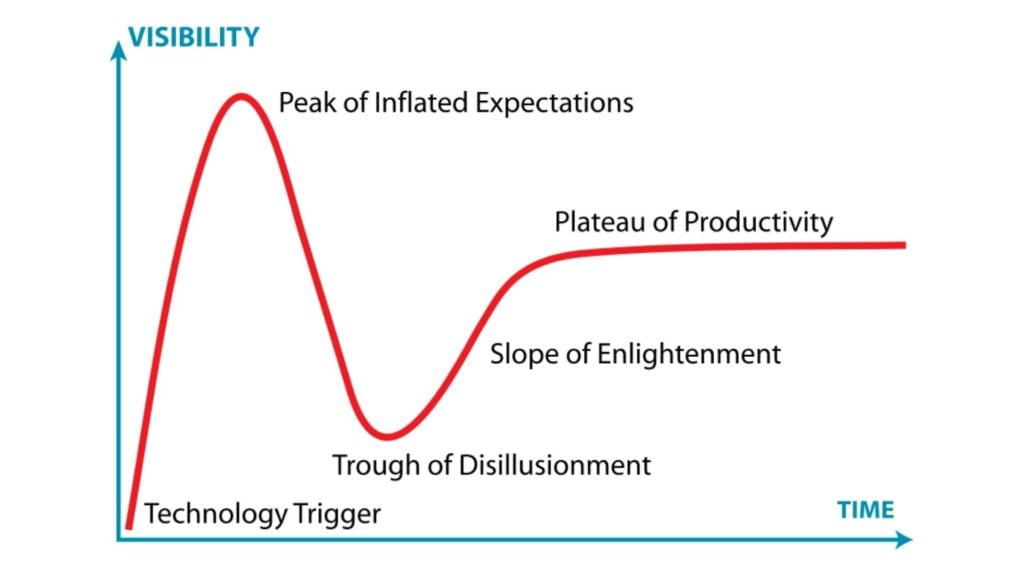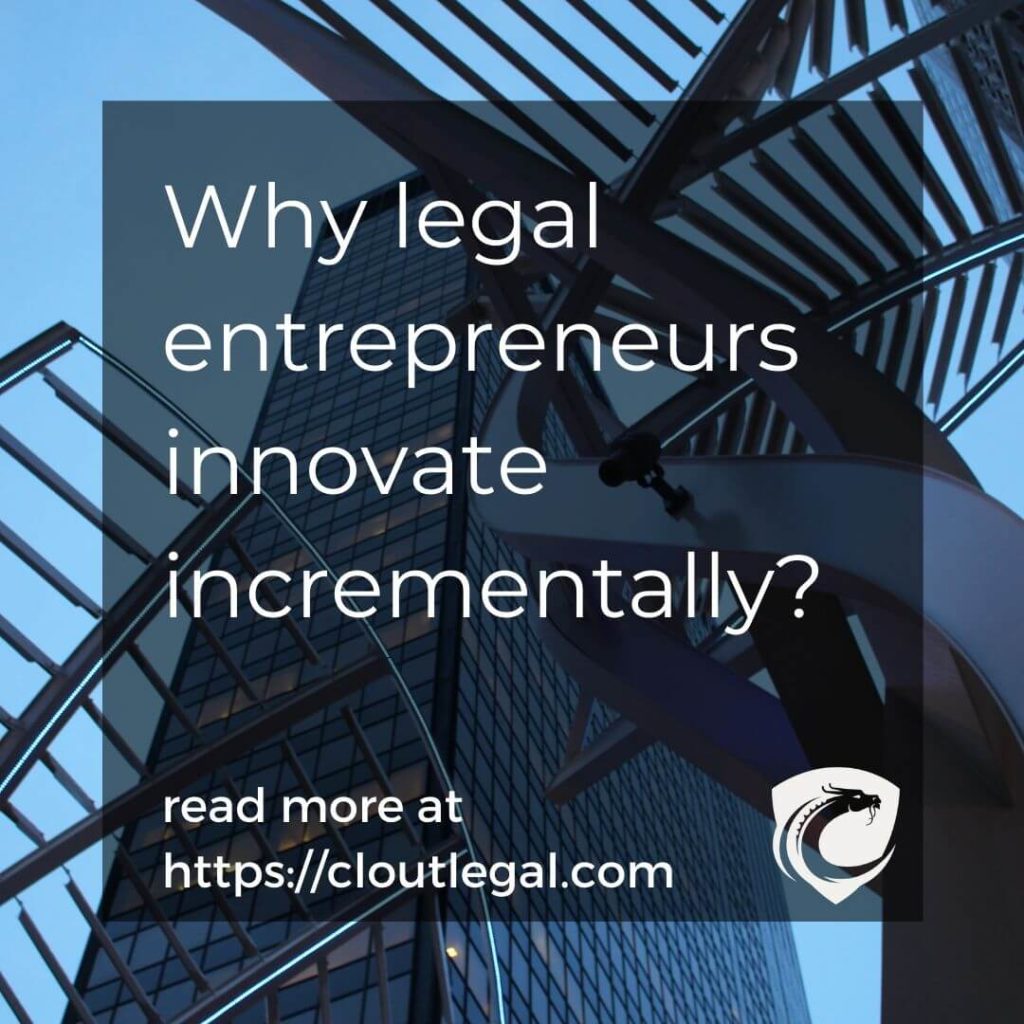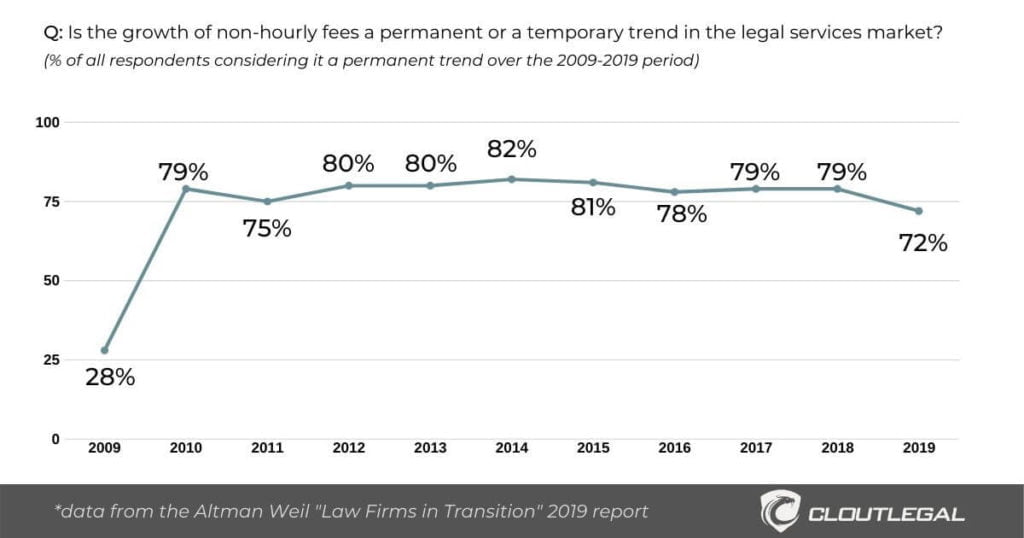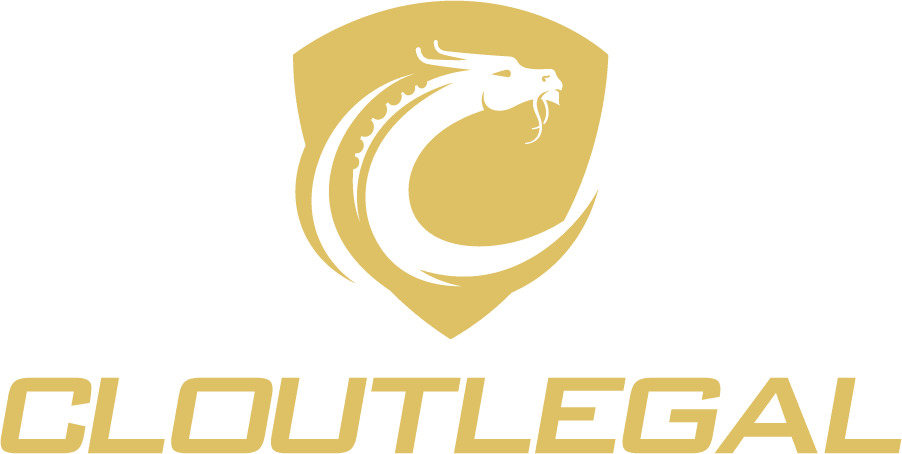Gradual innovation in the legal just doesn’t sell
When we speak about legal innovation (and the future of law), we often imagine dramatic changes.
Case in point - all the click-inducing article/book titles. You have probably seen them - “The end of lawyers”, “Robot lawyers” - and the like.
But in reality, innovation is much more incremental. Very rarely, we see disruptive moves. Evolutionary changes are much more prevalent.
“It is the essence of innovation to fail, mostly..." - Astro Teller
Power of the increment in the legal services market
Ron Friedmann recently laid his list of predictions for the 2020 legal services market. In doing so, he remarked:
“I’ve worked for three decades in the corporate legal market and have witnessed many incremental changes but few dramatic ones. Yet Big Law today does look rather different than it did when I started in the 1980s. The new look, however, flows from many small changes…”
Right to the spot.
There are many reasons why innovators would undergo small changes, rather than Earth-shattering tectonic moves. Authors sometimes scold lawyers for moving too slowly. However, legal innovation is no different from innovating in other sectors.
The business case for legal innovation
Innovation is pretty essential for any business to keep competing in the local or global arena. And the Business of Law is no different here.
"Innovation is critical to the heartbeat of any successful corporation in the industrialized world..." - Dinesh Paliwal
Before starting to introduce changes, it is crucial to have the prevalent WHY. There has to be a business case, and it needs to make sense for all stakeholders.
“Technology itself is not a silver bullet. Any implementation may fail if people aren’t buying the necessity of change. There should be a prevalent “WHY” to any legaltech application...”
The same goes for any innovation - whether it involves legal tech or not.
(yes, it IS possible to innovate without legal tech)
Every innovation needs to demonstrate its viability in numbers to continue to be supported. Legal innovation shouldn't merely run in the wild.
The risk of innovating legal services
Obviously, there is a risk with any change, and the same goes for adapting how you deliver your legal services.
Making huge leaps (and potentially destroying what currently works) may not grant you longevity in any Board room.
There is a good reason why you'd want to be careful and innovate the “safe” way.
Think of a laboratory, for example. Every lab experiment is being done in a strictly controlled environment. When a particular test turns south, the failure happens on a small scale. Hence, consequences are easily absorbed and contained.
Laboratories have been trying their hand at innovation for centuries. No reason to reinvent the wheel there - just follow their example on how to innovate.
(this is likely the reason why some BigLaw firms started their legal innovation incubators (the NextLaw Lab, e.g.), to be able to harness innovation the safe way)
Entrepreneurs’ approach to legal innovation
Entrepreneurs are painfully aware of their limited resources - in whatever shape or form (e.g. time, finances, skills, etc.).
Therefore, one defining trait of outstanding entrepreneurs (apart from not being afraid to experiment) is that they are jealously protective of their capital.
However, that doesn’t mean entrepreneurs are stingy when it comes to spending. More likely, it means they will look for ROI at every step they take.
So how does innovation fit here?
Simply:-
Entrepreneurs will seek to learn something new (about their target market, industry, segment, messaging, etc.) at all times.
So what does this mean for you?
To learn the most from your experiments, you need to be able to measure the impact of any and all changes you are making.
And to be able to measure the impact of your innovation efforts, you simply need to go small. Take incremental steps. Change ONLY ONE variable at the time.
Otherwise, if you make a dramatic change, it will be challenging to understand which variable had the most impact on the outcome of your experiment.
Are you a law firm partner? An executive in the legal services space? Corporate Counsel?
If you are in any of the above positions - you are, first and foremost, an entrepreneur. So think like one, and act like one.
Impact of the incremental legal innovation
You have probably heard about the “one percent a day” rule.
Yes, if you compound 1% every single day a year, you end up with the 37x multiplier, at whatever you were doing.
So don’t try to outrun anyone blindly. Clinically analyze what you are already doing, and see how you can be better at it, one percent at the time.
Predictions for 2020 legal market
Finally (and this is how it all started) here are Ron’s views on the legal services industry in 2020:-
“Law practice and law firm business: 2020 will see incremental change, notwithstanding the ongoing hype about innovation and AI. Even very visible economic changes – the e-commerce driven de-retailing of the US – takes years to unfold.
Law won’t move faster. With so many new legal products and new law firm innovation leads, the market needs time to absorb and deliver.”
This is absolutely spot on.
“Competitors to law firms and the supply side: 2019 saw Big 4 moves and explosive legal tech funding.
As with law firms, the impact will take time to play out. We’ve heard a lot about investment. Until we hear about returns, I am skeptical 2020 will bring more big investment or dramatic change.”
Also, one of the indicators the hype will not materialize any time soon - if 2019 was the year of explosive funding, we are now in the period of watching for the ROI, followed by the (draught) period of consolidation, per the Gartner Hype Cycle chart)
“Clients and legal operations: Both will mature in 2020. As I see the data, the rapid growth of legal ops has peaked, and it now faces a period of focusing on greater impact instead.”
(Gartner Hype Cycle chart in the nutshell)
Gartner Hype Cycle illustrated (image credits: Jeremy Kemp)
“Two 2020 wildcards: First, keep an eye on US states that may re-regulate law firm ownership rules. Outside owners would be big, but the UK experience suggests not market busting.
And second, a recession? If law firm demand plummets, which law firm innovation initiatives and legal tech companies survive?”
My vantage point?
I believe 2020 will be the year we see first semi-public experiments at some scale with no-code platforms. Productization of legal services is a vast topic, and it is starting to lift off. Law firm partners begin to dream about all the ways they can scale their legal service offerings (scale, not grow, please mind the difference).
However, I don’t believe we will see a mainstream application of the above concepts, not at least before 2021. I feel no-code platforms will initially focus on creating in-house apps for optimizing internal processes.
The truly EXCITING business cases have yet to be discovered by partners. And legal service productization has immense potential.
Recession? If the proverbial excrement hits the fan...
(a phrase frequently used by my Corporate Finance professor post-2008)
...I believe all the talk about alternative legal fees will start blowing up again. The technical analysis alone on this chart here would suggest so:
Permanent legal market trends 2009-2019 - Altman Weil Law Firms in Transition 2019
Nobody has a crystal ball, and if they do, it probably ain’t working. What we do have is the power of incremental change.
(thank you, Ron, for leading this discussion)
Ivan Rasic holds the Transnational Trade Law and Finance LLM, a program by Universidad de Deusto (Bilbao, ES), Universiteit van Tilburg (Tilburg, NL), and Goethe Universität (Frankfurt, DE). After his work in law firms and inhouse, he started a legal tech company.
Nowadays, Ivan leads STP Informationstechnologie GmbH's Sofia RnD center with project/development management, culture, strategy, and special project initiatives.
Ivan is an Ambassador at European Legal Tech Association (ELTA). He closely follows and writes on future of law, legal tech, ALSPs, and new ways of delivering legal services.
Ron Friedmann is an expert in law practice management, outsourcing, knowledge management, contract management, e-discovery, legal marketing, and technology for lawyers.
Ron assists law firms improve law practice and legal business management with tech, knowledge management, client understanding, and process improvement. He also enables legal departments to "do more with less", and helps legal providers expand their reach.
Ron frequently writes on the legal industry, large law firm management, law firm operations, service delivery, and more.
Ivan Rasic holds the Transnational Trade Law and Finance LLM, a program by Universidad de Deusto (Bilbao, ES), Universiteit van Tilburg (Tilburg, NL), and Goethe Universität (Frankfurt, DE). After his work in law firms and inhouse, he started a legal tech company.
Nowadays, Ivan leads STP Informationstechnologie GmbH's Sofia RnD center with project/development management, culture, strategy, and special project initiatives.
Ivan is an Ambassador at European Legal Tech Association (ELTA). He closely follows and writes on future of law, legal tech, ALSPs, and new ways of delivering legal services.


